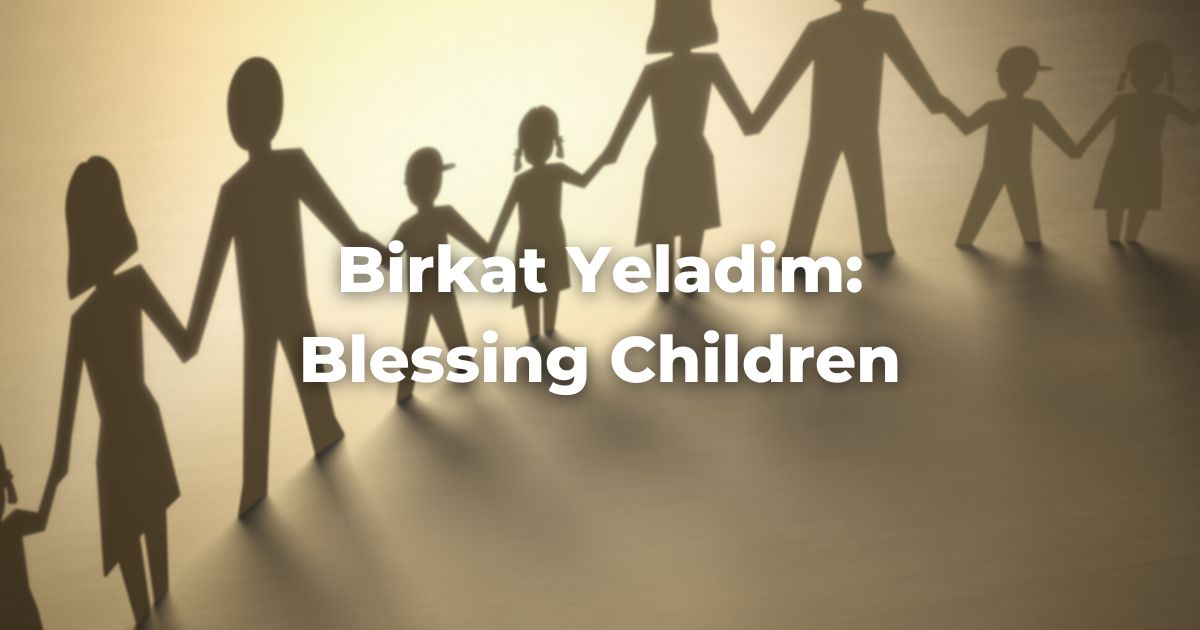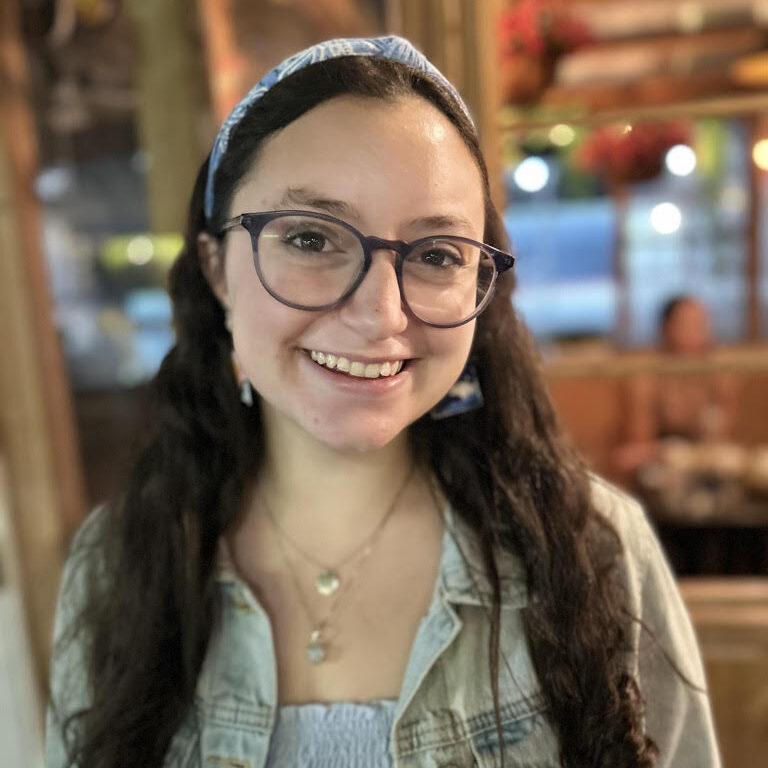Honoring our parents is the fifth of our ten most important laws (Exodus 20:12), known as the Ten Commandments given at Mount Sinai.
Teaching our children about our heritage is mentioned in our most important prayer—Shema—said three times every day, including the Bedtime Shema, before one goes to sleep at night (Deuteronomy 6:7, Deuteronomy 11:19).
Our patriarchs’ relationships between father and son take up more than one book of our Bible. God as our parent is a frequently used allegory in Biblical literature.
We learn from our holy books and prayers, from our teachers and ancestors, and most especially from God, that the relationship between parent and child is a paramount relationship.
We recognize and ritualize this at the outset of every Shabbat, in the form of a private moment between parents and children. Birkat Yeladim, blessing our children, can also be used during baby namings, b’ mitzvahs, weddings, school convocations, graduations—any important time when recognizing a child.
Birkat Yeladim happens throughout our childrens’ lives. While blessing our children might be easiest when they are young and sitting at the table with us, adult children can also be blessed in the same way. Some adult children have the custom of calling before Shabbat to receive their blessings, while others might get a special text. The opportunity to create new customs and traditions is ripe.
Birkat Yeladim draws from the biblical verses and ideas from Genesis and Ruth with Birkat Kohanim, the priestly benediction. We bless our children to be like our storied ancestors, while also giving them a connection to the Temple. Though we no longer have our central meeting place of worship, these small links keep us connected to our history and the whole of the Jewish people.
Most often and traditionally, Birkat Yeladim is recited on Friday nights, before the psalms, songs, and blessings that precede Shabbat dinner.
How to do the Traditional Blessing of the Children
Customarily, one or both parents will place their hands on their child’s head, while reciting the blessing. This is reminiscent of Jacob’s blessings for all of his children (Genesis 48-49), the source for this custom.
The general structure of the brachah, blessing, is a verse recognizing your child, followed by the priestly benediction. This is generally done by gender and you can find a non-binary option below.
For each child, choose a verse from Part A that fits your child best—this choice should be made with your child—followed by Part B, for all children.
Following the blessings below, parents are encouraged to take the time to offer personal prayers or meditations for their children.
Part A—Introductory Verses
For male-identifying children: May you be like Ephraim and Menasseh (Genesis 48:20).
יְשִׂמְךָ א-לֹהִים כְּאֶפְריִם וְכִמְנשֶּׁה.
Y’simchah e-lohim k’Ephraim v’chi’Menasheh.
For female-identifying children: May you be like Sarah, Rebecca, Rachel, and Leah.
יְשִׂמֵךְ א-לֹהִים כְּשָׂרָה רִבְקָה רָחֵל וְלֵאָה.
Y’simech e-lohim k’Sarah, Rivkah, Rachael, v’Leah.
For children of any gender: May God make you like Ephraim and like Menasseh (Genesis 48:20), May God reward your deeds with complete reckoning (Ruth 2:12).
יְשִׂמְךָ א-לֹהִים כְּאֶפְריִם וְכִמְנשֶּׁה.
יְשַׁלֵּם יְיָ פָּעֳלֵךְ וּתְהִי מַשְׂכֻּרְתֵּךְ שְׁלֵמָה׃
Y’simchah e-lohim k’Ephraim v’chi’Menasheh.
Y’shalem Adoni p’a’lech u’t’hi maskurtech s’leimah.
(See more: Yonah Bromberg Gaber’s explanation behind the writing of this alternative blessing)
Another option, for all children: [Combine both] May you be like Ephraim and Menasseh, may you be like Sarah, Rebecca, Rachel, and Leah.
יְשִׂמְךָ/ישִׁמֵךְ א-לֹהִים כְּאֶפְריִם וְכִמְנשֶּׁה, שָׂרָה רִבְקָה רָחֵל וְלֵאָה.
Y’simchah/y’simech e-lohim k’Ephraim v’chi’Menasheh, Sarah, Rivkah, Rachael, v’Leah.
Part B—Priestly Blessing
For all children: May God bless you and keep you. May God cause God’s spirit to shine upon you and be gracious unto you. May God turn God’s spirit unto you and grant you peace.
יְבָרֶכְךָ יְיָ וְיִשְׁמְרֶךָ.
יָאֵר יְיָ פָּנָיו אֵלֶיךָ וִיחֻנֶּךָּ.
יִשָּׂא יְיָ פָּנָיו אֵלֶיךָ וְיָשֵׂם לְךָ שָׁלוֹם.
Y’varekh’khah Adonai V’yishm’rekha.
Ya’eir Adonai panav eilekha vihuneka.
Yisa Adonai panav eilekha v’yaseim l’kha shalom.
Explanation of the Blessing for Children
The introductory verses:
The blessing that begins “May you be like Ephraim and Menasheh,” comes from “Jacob’s blessing for his grandsons” in Genesis 48:20.
Though Joseph’s sons are not as well-known as their father, we refer to them as model children because Jacob remarks “By you [i.e., by using your names] shall Israel invoked God’s blessing, saying, [May] God make you as Ephraim and as Manasseh.’”
Schwartz and Katz present a commentary that explains the significance of these brothers as role models that “though they grew up as members of a tiny majority in a much larger culture, they managed nevertheless to remain faithful to their family’s religious traditions.” So, we pray for our children to be like them.
The blessing that begins “May God make you like Sarah, Rebecca, Rachel, and Leah,” is such because these four women raised the first generation of the Jewish people.
Though the blessing does not come from a specific verse like the phrase about Ephraim and Menasheh. However, the roots for this verse are in Ruth 4:11. In that verse, Ruth herself is blessed that she be like Rachel and Leah, who together “built up the House of Israel.”
The Priestly Blessing:
The blessing for all children, found in Part B above, continues with the priestly benediction (Numbers 6:24-26) drawn from the ancient temple practice.
It is used in this context as “parents acknowledge that they are the agents, not the source, of God’s blessing in their children’s lives, just as the kohanim in Temple times were the transmitters, not the originators, of the blessings they offered the people.”
Though parents can choose to add their own meditations and personal blessings, you can find some meditations to use as a guide for your child.
(See more: The above quotes come from The Observant Life section on Shabbat by Michael Katz and Gershon Schwartz)
These meditations may be recited along with the traditional text:
- May God bless you with the strength and vision of Sarah, with the wisdom and foresight of Rebecca, with the courage and compassion of Rachel, with the gentleness and graciousness of Leah—and their faith in the promise of our people’s heritage.
- May you be blessed by God as were Ephraim and Menasheh, who understood that wherever they lived their Jewishness was the essence of their lives; who loved and honored their elders and teachers, and who cherished one another without pettiness or envy, accepting in humility the blessings that were theirs.
- “May you be blessed by God as were Ephraim and Manasseh, who understood that wherever they lived their Jewishness was the essence of their lives; who loved and honored their elders and teachers, and who cherished one another without pettiness or envy, accepting in humility the blessings that were theirs.”
- “May God bless you with the strength and vision of Sarah, with the wisdom and foresight of Rebecca, with the courage and compassion of Rachel, with the gentleness and graciousness of Leah, and their faith in the promise of our people’s heritage.”
These blessings were adapted from the Rabbinical Assembly’s meditations for “Blessing One’s Children” and the second edition of Siddur Sim Shalom. Please keep in mind adapting this to fit your child’s needs. Additionally, although delineated by gender, all of these meditations can and should be used for any children, regardless of gender.
Author
-

Reena Bromberg Gaber is a student in the Joint Program with Columbia University and the Jewish Theological Seminary. At school, she is involved with Columbia/Barnard Hillel, Gamma Phi Beta, the Columbia Daily Spectator, and Artists Reaching Out. Growing up, Reena was involved with the Conservative movement, including many summers as a camper and staff member at Camp Ramah in the Poconos and in local, regional, and international leadership positions in USY. As Reena moves through college and into adulthood, she is excited to find a space for herself and her peers in the Conservative movement.
View all posts






